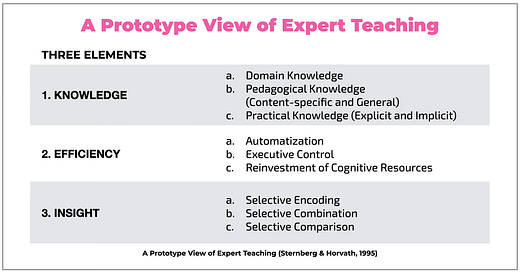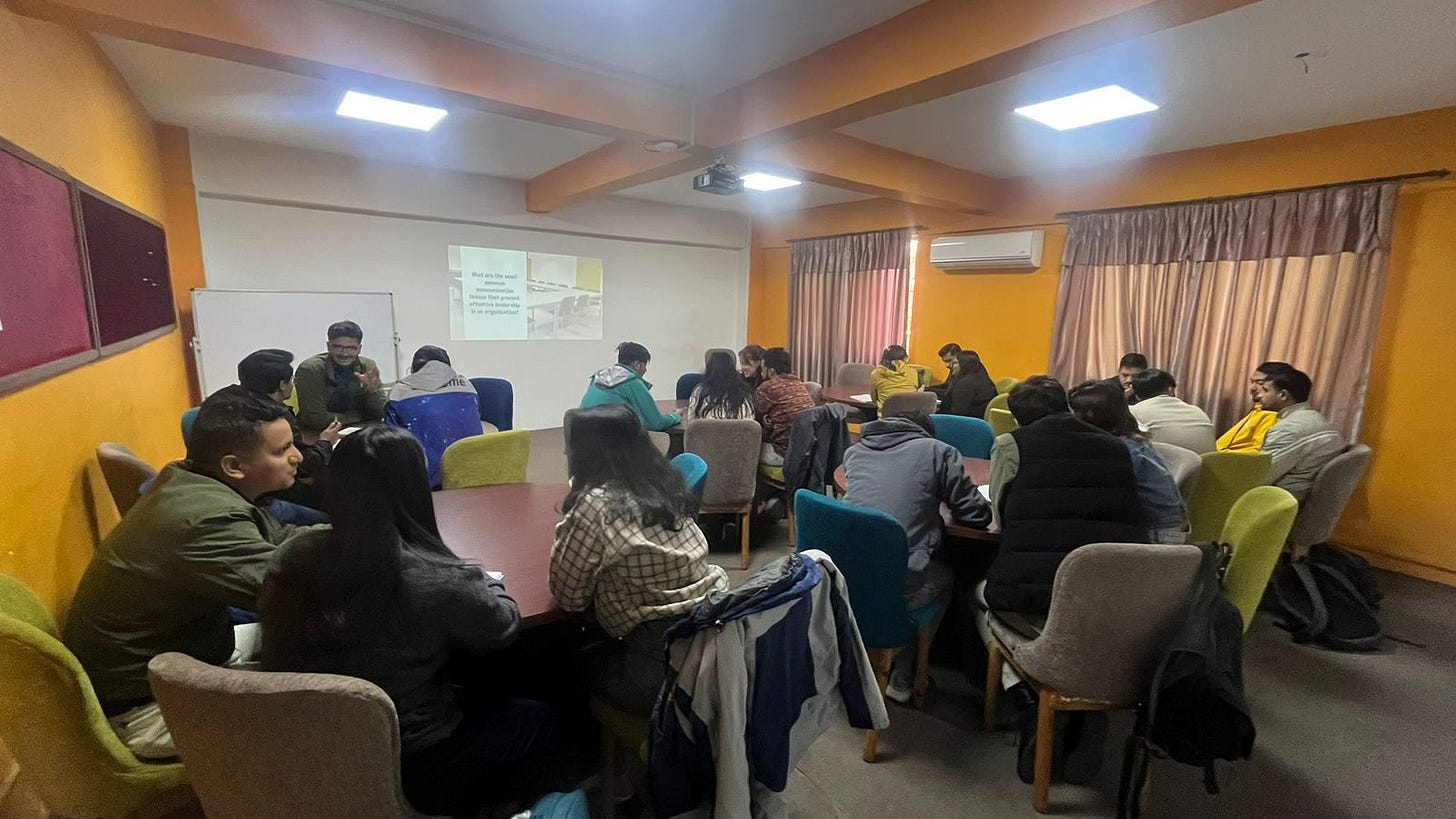We need a Definition:
Before we “argue” or “discuss” or “split hairs” about things, we need to first define what we are talking about.
That’s what I learnt from the Statis Theory from the ancient Greek philosophers. Otherwise, we will never come to a common understanding, let alone any meaningful discussion. And, let alone the changes we want to see.
Therefore, let’s first define what “expert teaching” is, so that we can talk about how we can understand more about this idea in concrete detail. And so hopefully we can implement them in our teaching practices every single day.
In their paper, aptly titled “A Prototype View of Expert Teaching”, researchers Sternberg and Horvath1 re-conceptualize teaching expertise grounded in a psychological understanding. They propose that teaching expertise to be viewed through the lens of a “prototype”. Let’s break this down.
So they ask: what are the features of the prototypical expert teacher?
They looked into psychological research on expert performance in different domains. And they came up with three basic ways in which experts differ from novices.
“The first difference pertains to domain knowledge. Experts bring knowledge to bear more effectively on problems within their domains of expertise than do novices.”
“The second difference pertains to the efficiency of problem-solving. Experts do more in less time (in their domain of expertise) than novices do.
“The third difference pertains to insight. Experts are more likely to arrive at novel and appropriate solutions to problems (again, within their domains) than are novices.”
To put these as an formula:
Expertise = Domain Knowledge + Efficiency + Insight
Now we can have a working definition:
An expert teacher is someone with a vast domain knowledge that enables him/her to teach with efficiency and can generate insights to make appropriate decisions in the class. This is within a specific domain of expertise.
Fun fact: Most people tend to label experts and expert teachers as “naturally talented”.
Alright, let me nerd out below:
1. Organization of Domain Knowledge:
Now, you could say that it’s too obvious. An expert teacher will surely have more domain knowledge than a novice teacher.
But for us, the thing that might be more interesting (and far less obvious) is what and how experts have “memorized” the domain knowledge in their long-term memory.
Experts have far superior memory (both in conscious and unconscious forms) than novices. Yup. The dreaded M-word.
First, WHAT types of knowledge do expert teachers have?
Content knowledge of the subject they are teaching
Pedagogical knowledge (general)
Pedagogical Content Knowledge (domain specific) (Shulman, 19872)
Second, HOW are these types of knowledge organized in their memory?
Expert teachers have clear, complex, and deep structures in their memory and can understand issues in terms of principles and theories. As a result, they have the ability to think at both abstract and concrete levels.
Whereas novice teachers have blurry, simple, and shallow structures in their memory and can understand issues in terms of concrete detail only. Basically due to lack of experience and lack of internalized understanding. As a result, they have the ability to think only at superficial levels.
Thus fundamentally, expert teachers and novice teachers differ in the way their domain-relevant knowledge is organized in their memory.
Expert teachers have, over the years, built knowledge that is deeply, strongly, and intricately integrated in the form of principles, patterns, schemes, frameworks, and structures, compared to the knowledge of novice teachers.
(Sidebar: I remember this line from cognitive scientist Dan Willingham: Understanding is remembering in disguise. This line might also change your perspective.)
2. Efficiency:
In an earlier post, I wrote about how expert teachers develop automaticity, complexity, and internalization. This enables them to do the simple things, that anyone else might be able to, but they do those simple things perfectly, quickly, and consistently.
Sternberg and Horvath also talk about this in terms of efficiency.
Expert teachers are able to think on their foot and quickly solve problems related to their domain. If there’s a class disruption, they solve it instantly. If a student is stuck in a problem, they instantly know the reason. They are also able to effectively plan, monitor, and revise their approaches to teaching, explaining, questioning, and problem-solving.
In a way, efficiency is about knowing where to put one’s attention, cognitive resources and mental processing so that one can perform tasks effortlessly.
Here’s an instance.
I have been in a classroom observation where a teacher delayed the class for 20 minutes because - wait for it - because there was no electricity and he could not use the projector. In a similar situation, I have seen another teacher not waste any time at all, come up with a Plan B and complete the lesson on time.
I’ve been in a school classroom where a teacher “wasted” precious 10 mins just to make students ready for the lesson. And another teacher who took may be 60 secs. (I am not judging any of these two however you know.)
A helpful idea would be: automatize the logistical and interactional parts of your classroom so that you can focus on teaching and learning.
Here’s some more from the paper:
“Expert teachers were found to be more planful than were novices in their approach to classroom discipline problems. Experts tended to emphasize the definition of discipline problems and the evaluation of alternative hypotheses, whereas novices tended to be more "solution oriented" and less concerned with developing an adequate model of the discipline problem.”
3. Insights:
This probably my favorite Gary Klein3 quote ever:
“Novices see only what is there; experts can see what is not there. Experts see the world differently. They see things the rest of us cannot. ”
Just brilliant.
Their experience lets them notice when something not-so-obvious to novices is missing. Plus, expert teachers can see both visible and invisible layers of interaction.
But that’s not it.
Not only can they see “beyond”, expert teachers then can quickly “connect the dots” and come up with creative and unique ways to solve any problems or issues.
But how are they able to do this?
Three things, according the researchers, that help expert teachers make insightful decisions are:
a. Selective Encoding: being able to notice what is relevant and what is not; knowing where to put one’s attention, and where to overlook.
b. Selective Combination: being able to combine two seemingly separate ideas or issues, and use the insights creatively.
c. Selective Comparison: being able to compare/contrast a current situation with a past incident, and come up with similarities and patterns. Also, being able to come up with analogies/metaphors, stories to understand an issue or to come up with solutions.
An instance of selective encoding is that an expert teacher can quickly recognize the student interactions that are likely to achieve the lesson objectives, and those that are merely irrelevant discussions.
Similarly, an expert teacher can differentiate between a “passive” looking classroom in which the students are thinking and processing versus a “passive” classroom because the students have nothing to do.
Alright. Here’s a table that summarizes this whole concept.
I hope you find this useful to talk about the differences between expert teachers and novice teachers. Next time, when we are having an argument or interaction about teachers and their nature of expertise, we can start from here. And then we can probably have a common understanding about good/bad teaching or about changes we want to see in teaching.
Sternberg, R. J., & Horvath, J. A. (1995). A Prototype View of Expert Teaching. Educational Researcher, 24(6), 9–17.
Shulman, L. S. (1987). Knowledge and teaching: Foundations of the new reforms. Harvard Educational Review, 57(1), 1-22.
Klein, G. (2017). Sources of Power: How people make decision. 20th Anniversary Edition.






Very well explained. When teaching in my domain areas, I am able to quickly pivot to extend, reteach or re-frame. If I am thrown into another domain, I am serviceable and due to my teaching experience provide, a satisfactory lesson (I hope), but I am much less capable of quickly identifying how to bring further students on, to predict misconceptions, or identify the cause of misconceptions the earlier students have.